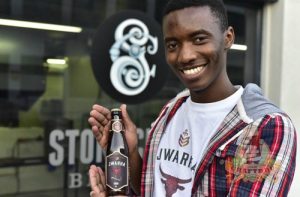
Khanyi Pupuma, founder of Ekhaya Brewery, launched his craft beer brewery in 2015 during what was something of a craft beer boom, when craft beer was at the height of its popularity and trendiness.
Pupuma says he knew that if he designed his brand around what’s trendy or ‘in’, his business would go the way of all things trendy – it would one day be irrelevant.
It was then that he made the decision to tell an authentic story instead – one that was centred around what was meaningful to both his brand and his audience, giving his brand a chance at longevity.
His craft beer manufacturing company produces the label “Jwarha“, an African lager that is named after his family clan. According to Pupuma the beer is “rich, with an earthy taste and flawlessly, dark complexion”.
“Jwarha is a strong African lager, and it has basically come from creating a beer that’s going to represent oJwarha – the Jwarha people/clan – and put it all in a bottle in a way that is going to represent who the Jwarha people are. When you actually look at the beer you see what kind of people the Jwarha people are,” says Pupuma and adds that the one thing he has managed to do pretty well, which is something he learnt quite recently, is telling an authentic story that will resonate with South Africans and Africans at large.
“One of my biggest lessons is that whenever you want to go in business, you mustn’t try to please everyone by creating a product for everyone”
Although not much of a beer drinker initially, Pupuma ventured into beer out of curiosity.
“So, I’d try beer out and I’d enjoy the commercial stuff. That’s what drew me to it. Everybody was drinking – I’d go to a business meeting, or hanging out with friends, there’s beer. So beer is just part and parcel of my day-to-day life. But it was not until I went to Beer House on Long Street that I came across craft beer and then I was hooked.”
“I got into the beer industry. I started brewing at home, attending some workshops on how to make beer for myself, purely from a hobbyist perspective when I started. From there, interest from friends and family grew and they were saying I should look into turning it into a business. I took it from there and started brewing commercially,” he says.
The popularity of craft beer is unsurprising. According to CNN, South Africa has always had a strong beer culture, with consumers traditionally opting for mass produced products by South African Breweries (SAB).
A Fresh Approach
Building a brand that is authentic in the eyes of the market and was not built on trends meant that Pupuma essentially had to make an about turn in his marketing strategy.
“When I came up with the concept, the idea was a beer made by an African for our African brothers and sisters (in the lower LSM market). That was the initial approach. It didn’t really work out in the beginning because I didn’t factor in the affordability as an element of the product. Craft beer is slightly more premium than your commercial beers out there. So the price per unit was slightly higher than what my target market or consumers were used to. What I decided to do was to relook the model, start to associate the brand with a specific target market, which was black, upwardly mobile middle class. That’s where I hit the sweet spot.”
It was in this market that Pupuma’s authentic approach to branding and marketing, that is rooted in his African heritage, found resonance.
He is now beginning to reap the rewards and is well on his way to becoming one of craft beer’s favoured market leaders.
The brand’s customer base is steadily growing, he says, and although their production volume is still relatively small compared to other microbreweries in the country, it is also seeing steady growth. Ekhaya Brewery, currently produces around 3 000 bottles of beer a month, delivering to liquor stores, bars and restaurants such as the popular IYO Burgers and award-winning Fire & Ice Hotel and retail chain, Spar Tops in Cape Town.
The average monthly output for a South African microbrewery stands at around 10 250 litres per month, according to beer expert, Lucy Corne, in her blog, The Brewmistress.
Ekhaya Brewery is also expanding their product line, says Pupuma. They recently introduced a new royal ale to the market called Dlamini, “a smooth and crisp royal ale with malty aroma”, that Pupuma says is an easy to drink and cool, summer beer. Together with more beer brands he plans to launch towards the end of the year, they will form part of his vision of the #RiseOfTheClans, a collection of beer brands within his stable that he hopes will dominate South Africa’s craft beer market.
The brand will also be expanding to the rest of the country beginning with Johannesburg later this year.
“One of my biggest lessons is that whenever you want to go in business, you mustn’t try to please everyone by creating a product for everyone. You have to create something that is going to generate interest towards itself. And focus on that otherwise you’re going to lose yourself trying to please everybody. To be honest people don’t know what they want.”
Khanyi Pupuma gives his 3 takeaways on the dangers of following trends and his goal to produce South Africa’s next iconic beer .
1. You Can’t Lead If You Are Following Trends
Trends are very important, but I try not to follow them. I view what we do now as something that’s never been done before. So it’s very difficult to follow trends with something that’s very authentic. Without sounding like I’m arrogant or anything, I believe that we are the trendsetters at the moment. We have to continue maintaining that standard. We can’t really say we’re trying to keep up with the modern trends.
2. Your Customers Will Normally See Through Your Marketing Gimmicks
As a small business, there’s only one way and that way is up. [The brand] is going to continue to grow at a very rapid rate as long as it speaks to our core values. The authentic story of what Ekhaya is about is making a proudly South African product owned by South Africans and tells the story of South Africans.
It’s not a trend, it’s something that’s very authentic. I think that’s very important. The more authentic your brand is the less you have to use marketing tricks to keep your consumers interested. The brand, in a way, speaks for itself and the authenticity of the brand is what carries the brand going forward. People normally see through marketing gimmicks and that’s normally what is responsible for the brand experiencing a great drop in customers as soon as things change.
3. Improving Should Be A Constant Goal
The quality of the product has continued to improve. We’ve moved from strength to strength. We continue to improve the equipment that we use to produce the beer. And [we continue to improve the product] based on market research and talking to people about any feedback across the brand.
We haven’t changed anything with regard to the look and feel of the brand, though we are going to be doing a re-brand just to excite things a little bit. But we definitely have plans to keep current. It’s important for a brand to do a facelift every now and then.


